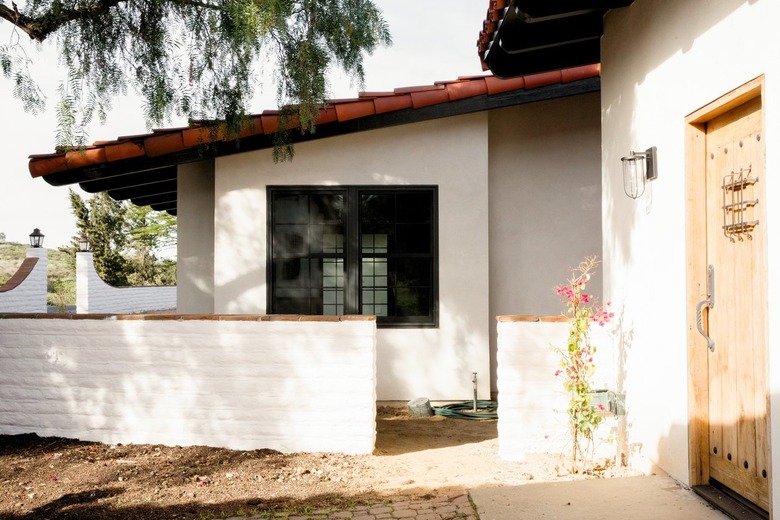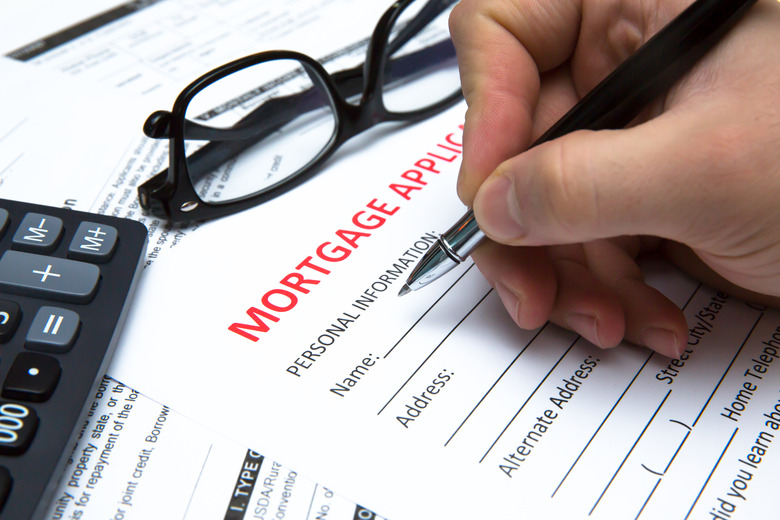What To Know Before You Hire A Mortgage Broker
You've finally saved enough for a down payment on the house of your dreams, but tracking down, reviewing, and comparing all the different loans and lenders out there is eating up your life. It may be time to hire a mortgage broker who can help you compare rates and find a good deal. A mortgage broker is a middleman between the borrower and the sea of lenders — a mortgage expert who does the legwork of filtering out the loan options to find those with the best rates. They compare loans and lenders, sorting through all the different types of mortgages to present you with a shortlist of loans that could work well for your particular situation.
Ready to find the best rate possible for your new home? Here's how to hire a trustworthy mortgage broker.
What a Mortgage Broker Does
What a Mortgage Broker Does
Think of a mortgage broker as the real estate agent for mortgages. Just like an agent works with you to locate homes that meet your specifications and budget, a mortgage broker works with you to find the best mortgage lender and loan that meets your needs. Mortgage brokers serve as a link between borrowers and lenders. They do the legwork for you, identifying the loan options and the lenders with the best rates. They also help by:
- Understanding the ins and outs of mortgage loans and using that expertise to guide and educate you.
- Walking you through the loan process that otherwise might be onerous, complex, and time consuming.
- Checking with a wide range of mortgage lenders, not just the usual suspects, to evaluate loans.
- Letting you know about bad apple lenders with difficult payment terms hidden in the fine print of their mortgage contracts.
- Getting you special rates from the lenders they use most frequently thanks to the volume of business they generate.
- Giving you extra loan options with lenders who work exclusively with mortgage brokers and do not accept applications from individual borrowers.
- Saving you money by getting some of the origination fees, application fees, and/or appraisal fees waived for you by their preferred lenders.
- Allowing you to apply
for several mortgages within a short time frame to avoid a handful of hard inquiries on your credit history. Each time a lender pulls your history, it brings your credit score down a little, but applying for multiple
mortgages within a short period counts as a single inquiry.
Doing Your Homework
Doing Your Homework
Getting a good mortgage depends first and foremost on having your own finances and credit in order. Well before you start looking for loans with or without the help of a broker, it's a good idea to check the basics to figure out how much of a house you can afford. Then, look at your credit score and take whatever action is required to clean up any blotches on your credit history. Having all of your financials ready to roll makes the mortgage application process easier.
A borrower chooses to work with a mortgage broker because of his experience and expertise in mortgage loans, a subject most people know little about, but that's no excuse for staying in the dark. It's better not to meet with a broker until you've done a little research first to get an overview of the different types of mortgage loans and the going mortgage rates in your area. An online mortgage calculator is useful to learn the basics. Get a few quotes from lenders too just to get a sense of what is out there.
Why Hire a Mortgage Broker?
Why Hire a Mortgage Broker?
Hiring a mortgage broker is not the only way to get a mortgage. Of course, it's important to shop around for a loan, but many borrowers work directly with lenders to discuss financing a home purchase. In fact, if you have a great working relationship with a bank or a credit union, you might be able to lock in a terrific mortgage quickly on your own.
Not everyone has close connections to a financial institution. For these borrowers, bringing in a mortgage broker to find a lender may be better than going it alone. Just like experienced real estate agents will understand the market better than you do since it's what they do for a living, a mortgage broker should have extensive information about lenders and their loan terms. This can save you hours of reading the fine print of contracts and steer you away from terms that will be problematic.
A mortgage broker can also speed up the process of finding and getting a good home loan. Anyone who is ready for the home buying process wants to move forward quickly with the paperwork. Mortgage brokers have worked with all sorts of different lenders before and can often speed things up significantly. In addition, some lenders only work with brokers. That means your mortgage broker may have access to lenders with whom you could not apply otherwise, opening up new options. Brokers can sometimes get you better rates and can even get some of your mortgage fees waived.
On the other hand, not every real estate expert recommends using mortgage brokers, and there are disadvantages to consider. First, don't assume that because you bring in a mortgage broker, you are guaranteed the best mortgage deal out there or even a better one than you could get on your own. If you have some experience with finance or a good banking relationship, you may be able to do the work yourself with equally good results. Some lenders do not work with brokers at all, so working alone would open up access to these lenders. Working alone, you can avoid paying the mortgage broker fee.
In addition, the mortgage broker's interests may not align with yours. A borrower's goal when they shop for a mortgage is to find the most affordable interest rate for the long haul and the lowest fees. The mortgage broker may get their fees paid by the lender and will naturally be interested in getting a borrower to sign up for the mortgage that maximizes their compensation.
It's also important to realize that when a broker gives you loan offers, these are estimates. They are called "good faith estimates," which means the broker believes they can get that deal. However, estimates are not guaranteed. This is like the difference between prequalification and preapproval. A lender may offer different terms and a higher rate once he sees your actual application.
Finally, just like in every occupation, there are good mortgage brokers and not so good ones. They are not all equally skilled and knowledgeable about loans, and they have different levels of experience. If your broker doesn't know all the loan options or the details of various loans, you aren't likely to get the best loan deal.
Questions to Ask a Mortgage Broker Before Hiring
Questions to Ask a Mortgage Broker Before Hiring
A good mortgage broker is one who is not only experienced and knowledgeable but is also someone you trust and with whom you feel comfortable working. To be sure that's the case, it is essential to ask questions of a broker before you commit to working with them. This process is a winning one for the broker too since the more information a broker has about you and your situation, the better the advice and assistance they can offer. So, ask anything that seems important but don't omit the essentials.
1. How Long Have You Been in Business?
First, learn all you can about the broker's experience and how long she's been in the business. Ask them to tell you about loans she has closed before. See whether they can give you a few references from prior clients or real estate agents they have worked with who are willing to share their experiences. Ask the broker about mortgage providers with whom they regularly work.
2. What Are Your Fees?
Ask about the broker's fees or rates early in the process. Mortgage brokers are paid for their services by either the borrower or the lender. Expect the fee to be between 1 percent and 3 percent of the loan amount. If the broker takes the fee from you, ask whether it can be added to the loan amount or if it must be paid up front. If lenders pay the broker's fees, you still want to know the percentage since the broker may be more interested in getting you to sign up for the particular loan where their fee is highest rather than finding the one that is most appropriate for your circumstances.
3. What Kind of Loan Would be Best For Me?
Finally, get the broker's thoughts on what kind of loan would be best for your situation and the amount of down payment that would work best. The broker won't be able to answer this without getting some background information from you. They should be able to explain the different types of loans and their benefits and disadvantages as applied to your circumstances. Do they suggest a fixed-rate mortgage (with an interest rate that never changes over the life of the loan) or an adjustable mortgage rate (with an interest rate that can fluctuate)? See if the broker explains things in a way that is easy to understand.
The Cost of Hiring a Mortgage Broker
The Cost of Hiring a Mortgage Broker
Loan officers work for banks and are paid a salary by their employer, but mortgage brokers are licensed professionals who operate independently. A mortgage broker charges a fee for their services. They are required to disclose all fees up front and cannot charge more than the fee amount she discloses. The broker usually doesn't get paid up front but only once a loan closes and the funds are released.
Sometimes, the borrower pays the broker's fee, but sometimes, it is picked up by lenders. The fee is not set by law, but it usually ranges between 1 and 3 percent of the loan amount. Generally, a buyer can pay the fee up front or opt to have it added to the loan. That means that if you are paying the fee, it will be on top of the mortgage amount.
The larger the loan, the more the mortgage fee will be. For example, a borrower seeking a mortgage loan of $500,000 would likely pay between $5,000 and $15,000 in fees to a mortgage broker. The $5,000 represents a 1 percent fee; $15,000 is a 3 percent fee.
Mortgage Broker Licensing and Certification
Mortgage Broker Licensing and Certification
The National Mortgage Licensure System (NMLS) provides the training and testing for mortgage brokers. To work as a mortgage broker, an individual must participate in a 20-hour class in a prelicensure program offered by the NMLS. This covers the laws a broker needs to know, both state and federal, about mortgages and loan officer ethics. Once the class has been completed, the person must pass the SAFE Mortgage Loan Originator Test. This includes a national test that applies everywhere as well as a state-specific portion. When the individual passes the test, they have their mortgage broker license. After that, they must take continuing education classes to keep their license current.
References
- The Associates Home Loan of Florida: Should You Hire a Mortgage Broker?
- Life Hacker: When to Hire a Mortgage Broker
- iCharts: 10 Reasons Why You Need To Hire A Mortgage Broker
- Upscale Living: Useful Tips For Hiring A Mortgage Broker
- Realtor.com: How Do Mortgage Brokers Get Paid?
- Realtor.com: Mortgage Broker vs. Bank: Which Is Better for Buying a Home?
- Realtor.com: How to Become a Mortgage Broker: 4 Steps to a Career in Home Loans


